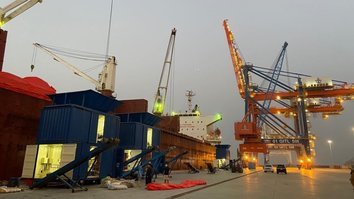PESHAWAR -- Both Pakistanis and Afghans are welcoming a decision by Islamabad to approve the Khyber Pass Economic Corridor (KPEC).
The Executive Committee of the National Economic Council on July 16 authorised several projects, including KPEC, the Express Tribune reported.
The project entails a 48km-long four-lane expressway between Peshawar and Torkham, to be complete by June 2024, that will link Pakistan and Afghanistan with Central Asia through the Khyber Pass, according to the World Bank, which last December agreed to provide $406.6 million (Rs. 68 billion) for the initiative.
KPEC is expected to generate local economic opportunities and create up to 100,000 jobs for Pakistanis in Khyber District, the World Bank said in a statement released last October.
![Container-laden trucks form a queue near the Torkham border crossing in June while heading to Afghanistan. [Courtesy of Zia-ul-Haq Sarhadi]](/cnmi_pf/images/2020/08/03/25197-transport2-585_329.jpg)
Container-laden trucks form a queue near the Torkham border crossing in June while heading to Afghanistan. [Courtesy of Zia-ul-Haq Sarhadi]
The project will usher in an economic revolution, Federal Minister for Religious Affairs Noor-ul-Haq Qadri predicted in June, according to Radio Pakistan.
"The project is of prime importance for bringing a positive turnaround in regional trade," said Shahid Shinwari, convener of the Federation of Pakistan Chambers of Commerce and Industry on trade among Pakistan, Afghanistan and Central Asia.
It also will open up a new era of commerce and trade in the newly merged districts, which are in dire need of economic stability after militants wrought havoc in the region, he added.
"The project has a far-reaching impact on the economy of the region because it has the potential of not only improving trade relations between Pakistan and Afghanistan, but also to revive the historic trade link between Central and South Asia," said Shinwari.
The execution of the project will benefit the whole border region between Pakistan and Afghanistan by giving impetus to trade between the two countries, he said.
Shinwari welcomed the development and urged the timely completion of the project so that the region could benefit.
Benefitting millions
"Approval of KPEC augurs well for development of the newly merged districts and the promotion of business in the region," said Abdul Jalil Jan, senior vice president of the Sarhad Chamber of Commerce and Industry.
The project will benefit millions of inhabitants in the whole region including a number of countries, he said.
Pakistan and Afghanistan are both terrorism-affected countries and the launching of such developmental projects is the need of the hour for bringing a positive turnaround, Jan said.
The business community fully welcomes this initiative and is pinning its hopes of a better future on improving trade in the region, he added.
Haji Zalmey, an Afghan businessman and president of a traders' union in Jalalabad, Afghanistan, also welcomed the approval of KPEC and expressed hope that the project will boost trade between Pakistan and Afghanistan and in the whole region.
The improvement of communication links in the region will help in reviving the centuries-old historic trade route and create more opportunities for businesses to initiate new commercial ventures, he said.
The provision of business opportunities is the best tool for creating jobs, and residents of the region need such initiatives so that they can come out of the long-standing recession caused by terrorism, Zalmey said.

![Trucks loaded with containers are parked on June 19 at an open area near the Torkham border crossing for passage to Afghanistan. [Courtesy of Zia-ul-Haq Sarhadi]](/cnmi_pf/images/2020/08/03/25196-transport1-585_329.jpg)







This is a very good project. Its must be made a priority to bring economic prosperity to tribal areas.
Reply1 Comment(s)